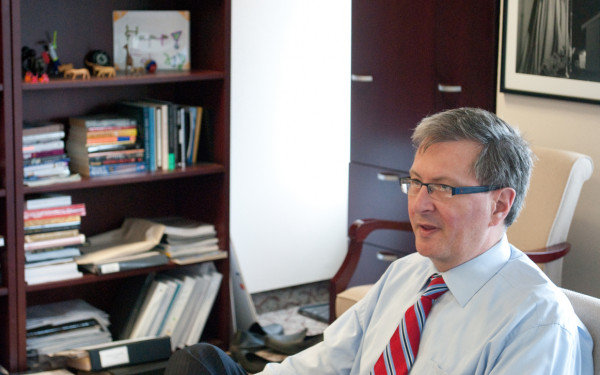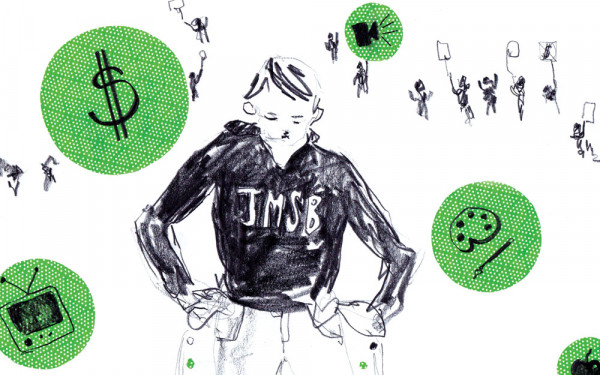CASA Elections Ahead
Presidential Hopefuls Looking to Raise Student Awareness of Association
Elections for the Commerce and Administration Students’ Association begin today and both presidential candidates are looking to increase student awareness of the association.
CASA represents over 7,000 undergraduate students at the John Molson School of Business. Karl Guiragossian, one of the two presidential candidates, feels that there is a disconnect between student leaders and the student body.
“For me, the first step is to actually go to the lobby, try to meet as many people as possible, and also extend [event] invitations to as many people as you cross,” he said.
“Human interaction” and being as “inclusive as possible” to people would be important aspects in achieving this goal.
“It would really be to strengthen that culture and make sure that it’s something that doesn’t only exist on Facebook—that people actually feel when they walk into the school,” Guiragossian explained.
Supporting the association’s leaders is also an important strategic direction that he would push. There are 14 associations and committees—which are called subsidiaries—within CASA. Guiragossian would like to ensure that all sacrifices student leaders make are “worthwhile.”
“I want to really make somebody feel like their time and their efforts are appreciated, and that they feel comfortable bringing things forward and sharing their ideas, and giving back to the people that they want to give back to,” he said.
Evan Pitchie, current VP External Affairs at CASA and presidential candidate, would like to increase both reach and engagement with students.
“When elected, I’m definitely going to focus on creative new ways of trying to get students to see who we are, what we do, and what we can offer,” he said.
Updating the CASA website, and increasing presence in the MB lobby would help achieve this, according to Pitchie.
He does not believe that there is a disconnect between CASA and students, but rather a lack of knowledge about what the association does.
CASA-JMSB’s mandate
Melissa Payette, the current president of CASA, described the association’s mission as adding value to student life.
There are three pillars outlined in CASA’s annual strategic plan. They are: providing academic support, building a network, and creating a sense of corporate citizenship and philanthropy.
“Everything that we do adds tangible value to students in one of those ways,” Payette said.
The association holds numerous events throughout the year that are meant to meet these goals, including a Business Banquet, which serves to connect recruiters and students, and a Women in Business Conference among others.
Their more philanthropic work includes an event called “5 Days For The Homeless,” which takes place across Canada and aims to raise money and awareness for “youth at risk.” CASA also holds an event called “Santa Supply Chain” to donate gifts to charity.
Additionally, Payette spoke about an initiative called the External Conference Program, which aims to send students to conferences across Canada.
“It’s something that I love that CASA does, I’ve loved it for years,” she said. “So we added budget to that, and we definitely pushed on promotion for that.”
Social events such as Frosh and the Halloween party are also important for the association.
“Faculty views student involvement at JMSB as a huge thing. Not only is it good for students, not only is it good for faculty, but it really puts the name of JMSB out there,” Payette said.
The cost of adding value
At the presidential debate, which was held on Feb. 11, Guiragossian had questions concerning the association’s budget.
“$7,000 for general marketing, $7,000 for telephone expenses, $25,000 for accounting and book-keeping expenses—these are just things I have questions for,” he said.
It was also brought to The Link’s attention through a letter that $43,000 was spent on a simulated stock exchange event called JMSX, hosted by a CASA subsidiary.
Payette explained that the high cost of the event was due to its need for expansion. In past years, the event sold out so quickly that the organizers decided to move it to a bigger venue.
“That event in particular adds so much more value than you’d expect. We had students coming in from all across the world—from Europe, from Asia—just to come to this one-day finance stock event,” Pitchie said about JMSX. “It justified the expense, because its adds value to students, it puts JMSB on the map.”
Cuts to other sections of the budget were necessary in order to accommodate the event’s costs. Cuts meant to accommodate overspending are spread throughout the budget.
“A lot of it has to do with cutting in little places, here and there, all over the place. Most operational [costs],” CASA VP Finance Nik Chyzenski said. “You try and take where you can without ruining the experience for the student, and I don’t think the things that we were cutting necessarily did that.”
Despite costly events and other expenses, the association has run a few consecutive yearly surpluses.

WEB_900_604_90.jpg)




_600_375_90_s_c1.jpg)
_600_375_90_s_c1.jpg)